[Click on BLUE links for further information]
On Think in the Morning Facebook page we post a poem every day with a selection of Sea Gull Cellar Bar Napkin Art or a photo. To receive these daily poems and napkin art on Facebook, “Like” our Facebook page.
To date we have posted over 100 poems and napkin art from a long list of artists. Unfortunately Think in the Morning cannot identify all the artists as some of the napkins are unsigned. We have done our best and welcome any comments from readers who can help us out. Artists identified thus far include:
Sandra Lindström
Goslyn
Dasher
Mike Evans
Sula
Robert Evans
Bob Avery
Efroym
James Maxwell
Mariama Jones
Marjorie Whittig
Olaf Palm
Richard Albright
W.A.H.
Jack Haye
R.T.S.
Sterling
Marina
D.M.C.
Karen Kessler
Lori
Edweena
Q.
Estelle Grunewald
RBH
Periodically we collect the Think in the Morning poems and art to post on this website. This is the 6th such posting. Links to the other five poem pages are outlined in blue below.
POEMS – 6
The Good Life
Tracy K. Smith
When some people talk about money
They speak as if it were a mysterious lover
Who went out to buy milk and never
Came back, and it makes me nostalgic
For the years I lived on coffee and bread,
Hungry all the time, walking to work on payday
Like a woman journeying for water
From a village without a well, then living
One or two nights like everyone else
On roast chicken and red wine.
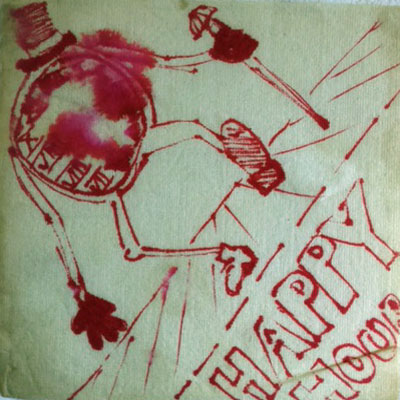
Sea Gull Cellar Bar Napkin Art, artist unknown
This Unimportant Morning
Lawrence Durrell
This unimportant morning
Something goes singing where
The capes turn over on their sides
And the warm Adriatic rides
Her blue and sun washing
At the edge of the world and its brilliant cliffs.
Day rings in the higher airs
Pure with cicadas, and slowing
Like a pulse to smoke from farms,
Extinguished in the exhausted earth,
Unclenching like a fist and going.
Trees fume, cool, pour – and overflowing
Unstretch the feathers of birds and shake
Carpets from windows, brush with dew
The up-and-doing: and young lovers now
Their little resurrections make.
And now lightly to kiss all whom sleep
Stitched up – and wake, my darling, wake.
The impatient Boatman has been waiting
Under the house, his long oars folded up
Like wings in waiting on the darkling lake.
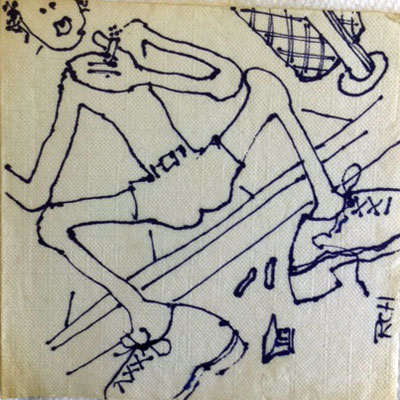
Sea Gull Cellar Bar Napkin Art, Roy Hoggard artist
Monday Bonus Poem
The Moon is Happy
The moon is happy.
There is a willing tide.
An owl
Responding like grandfather
To a change in the weather
Crosses the limits of
Reflection
Moving confidently
Through his world of dreams.
From where I sit I can see the dust
Upon those gathered dreams.
It does not come off too easily
This dust
Collected over many years
Of waiting.
These are extra dreams.
Dreams left sitting under the doormat
For an emergency
Or an unexpected friend.

Satellite
Matthew Dickman
I’m sitting beneath the bent
live oak, wishing the plane blinking above me
was a satellite that would shoot images
of my older brother back down into my brain
so I could print them out
and paste them on the wall. I have to
keep looking at this one picture of him
to remember how his jaw was and which side of the moon
he parted his hair. He’s always
away from me now, some animal or constellation
that walked out of the world but for rumors
and half skeletons found in the Congo, drawings
of what they might have looked like. My brain dreams
about cities from outer space, a place with a name
like Kilimanjaro where he might still be walking around in his Vision
Street Wear high tops, or even a shadow like my father
who talked about Costco the night of my brother’s cremation and how
pumpkiny the pumpkin pie was
though he bought it in a frozen pack of twenty. Just like a real bakery,
he said, you just throw it in the oven,
he kept saying that, you just throw it in the oven, you just throw it in
the oven.
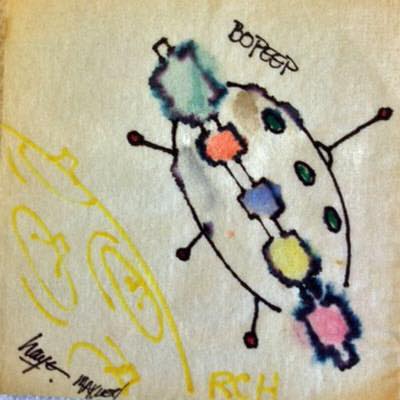
Sea Gull Cellar Bar Napkin Art, James Maxwell, Jack Haye, Roy Hoggard artists
The Dawn
Frederico Garcia Lorca
The New York dawn has
four columns of filth
and a hurricane of black doves
that splash about in polluted waters.
The New York dawn howls
from its teeming fire escapes,
searching between the cracks
of its perfumed anguish.
The dawn rises and no one receives communion,
for the morning offers no hope.
There are times when furious swarms of coins
penetrate and devour its abandoned children.
The first to go out in the morning know in their bones
that there is no paradise, no petals of love to be pulled:
they know they will be stuck in numbers and laws,
in mindless games, in fruitless labor.
The light is buried under chains and sirens
in the shameless pursuit of rootless science.
Its people stagger sleeplessly to the boroughs
as if they just left a bloody disaster.
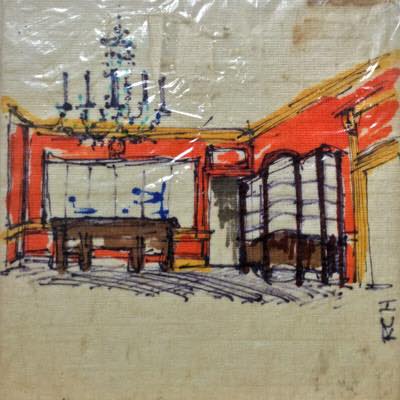
Sea Gull Cellar Bar Napkin Art. Roy Hoggard artist
Here Where Coltrane Is
Michael S. Harper
Soul and race
are private dominions,
memories and modal
songs, a tenor blossoming,
which would paint suffering
a clear color but is not in
this Victorian house
without oil in zero degree
weather and a forty-mile-an-hour wind;
it is all a well-knit family:
a love supreme.
Oak leaves pile up on walkway
and steps, catholic as apples
in a special mist of clear white
children who love my children.
I play “Alabama”
on a warped record player
skipping the scratches
on your faces over the fibrous
conical hairs of plastic
under the wooden floors.
Dreaming on a train from New York
to Philly, you hand out six
notes which become an anthem
to our memories of you:
oak, birch, maple,
apple, cocoa, rubber.
For this reason Martin is dead;
for this reason Malcolm is dead;
for this reason Coltrane is dead;
in the eyes of my first son are the browns
of these men and their music.

Sea Gull Cellar Bar Napkin Art, Bob Avery artist
Nocturne
Ruben Dario
to Mariano de Lavia
You who’ve heard the heart of the night,
you with your tenacious insomnia, who’ve heard
the closing of a door, the distant resonance of a car,
a vague echo, a thin sound …
In the moments of mysterious silence,
when the forgotten ones arise from your prison,
in the hour of the dead, in the hour of repose,
you’ll read these lines of impregnable bitterness!
Like an emptied glass into which I pour the pain
of distant memories and disgraceful misfortunes,
and the sad nostalgia of my soul, drunk on flowers,
and the grief of my heart, depressed by parties.
And the burden of not being what I could have been,
the loss of the kingdom that was there for me,
the thought that I might have never been born,
and the dream of my life since it began!
All of this emerges from the deep silence
in which the night envelopes the illusion of earth,
and I feel like an echo of the world’s heart,
which penetrates and shakes the core of my own.
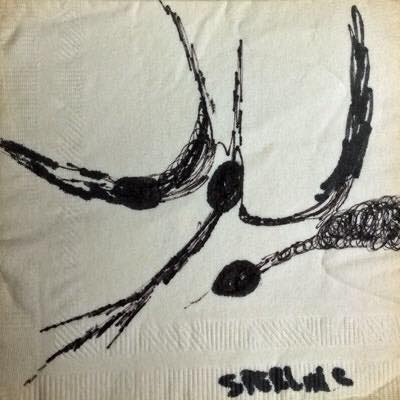
Sea Gull Cellar Bar Napkin Art, artist unknown
Just You Wait
Written by Alan Jay Lerner, Frederick Loewe
Just you wait, ‘enry ‘iggins, just you wait
You’ll be sorry but your tears ‘ll be to late
You’ll be broke and I’ll have money
Will I help you? Don’t be funny
Just you wait, ‘enry ‘iggins, just you wait
Just you wait, ‘enry ‘iggins, till you’re sick
And you scream to fetch a doctor double quick
I’ll be off a second later and go straight to the theatre
Oh ho ho, ‘enry ‘iggins, just you wait
Ooo ‘enry ‘iggins
Just you wait until we’re swimmin’ in the sea
Ooo ‘enry ‘iggins
And you get a cramp a little ways from me
When you yell you’re going to drown
I’ll get dressed and go to town
Oh ho ho, ‘enry ‘iggins, oh ho ho, ‘enry ‘iggins, just you wait
One day I’ll be famous, I’ll be proper and prim
Go to St. James so often I will call it St. Jim
One evening the king will say, “Oh, Liza, old thing
I want all of England your praises to sing”
Next week on the twentieth of May
I proclaim Liza Doolittle day
All the people will celebrate the glory of you
And whatever you wish and want I gladly will do
“Oh thanks a lot” king says I, in a manner well bred
But all I want is ‘enry ‘iggins ‘ead
“Done, ” says the king with a stroke
Guard, run and bring in the bloke
Then they’ll march you, ‘enry ‘iggins to the wall
And the king will tell me, “Liza, sound the call”
As they raise their rifles higher, I’ll shout
“Ready, aim, fire”
Oh ho ho, ‘enry ‘iggins down you’ll go
‘Enry ‘iggins, just you wait
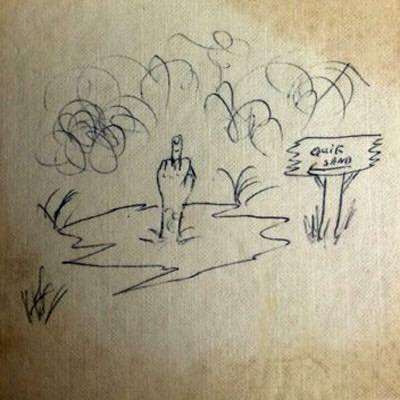
Sea Gull Cellar Bar Napkin Art, artist unknown
Eye
Charles Wright
Insensitive or discreet
In it the passions move
Seeking an entrance
In it the seasons meet
Mosslike with blood
Blended in clouds
The future a certain map
When the lid shuts
It is a reflection
It is a drawplate
The left and the right
Indistinguishable
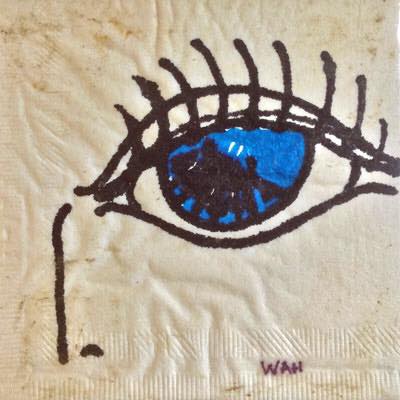
Sea Gull Cellar Bar Napkin Art, WAH artist
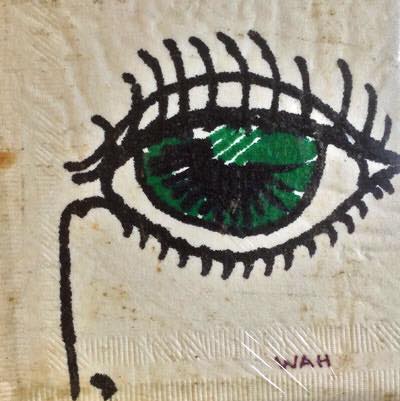
Sea Gull Cellar Bar Napkin Art, WAH artist
Ode on the Death of a Favourite Cat Drowned in a Tub of Goldfishes
Thomas Gray
’Twas on a lofty vase’s side,
Where China’s gayest art had dyed
The azure flowers that blow;
Demurest of the tabby kind,
The pensive Selima, reclined,
Gazed on the lake below.
Her conscious tail her joy declared;
The fair round face, the snowy beard,
The velvet of her paws,
Her coat, that with the tortoise vies,
Her ears of jet, and emerald eyes,
She saw; and purred applause.
Still had she gazed; but ’midst the tide
Two angel forms were seen to glide,
The genii of the stream;
Their scaly armour’s Tyrian hue
Through richest purple to the view
Betrayed a golden gleam.
The hapless nymph with wonder saw;
A whisker first and then a claw,
With many an ardent wish,
She stretched in vain to reach the prize.
What female heart can gold despise?
What cat’s averse to fish?
Presumptuous maid! with looks intent
Again she stretch’d, again she bent,
Nor knew the gulf between.
(Malignant Fate sat by, and smiled)
The slippery verge her feet beguiled,
She tumbled headlong in.
Eight times emerging from the flood
She mewed to every watery god,
Some speedy aid to send.
No dolphin came, no Nereid stirred;
Nor cruel Tom, nor Susan heard;
A Favourite has no friend!
From hence, ye beauties, undeceived,
Know, one false step is ne’er retrieved,
And be with caution bold.
Not all that tempts your wandering eyes
And heedless hearts, is lawful prize;
Nor all that glistens, gold.

Sea Gull Cellar Bar Napkin Art, artist unknown
Getting in the Wood
Gary Snyder
The sour smell,
blue stain,
water squirts out round the wedge,
Lifting quarters of rounds
covered with ants,
“a living glove of ants upon my hand”
the poll of the sledge a bit peened over
so the wedge springs off and tumbles
ringing like high-pitched bells
into the complex duff of twigs
poison oak, bark, sawdust,
shards of logs,
And the sweat drips down.
Smell of crushed ants.
The lean and heave on the peavey
that breaks free the last of a bucked
three-foot round,
it lies flat of smashed oaklings –
Wedge and sledge, peavey and maul,
little axe, canteen, piggyback can
of saw-mix gas and oil for the chain,
knapsack of files and goggles and rags,
All to gather the dead and the down.
the young men throw splits on the piles
bodies hardening, learning the pace
and the smell of tools from this delve
in the winter
death-topple of elderly oak.
Four cords.
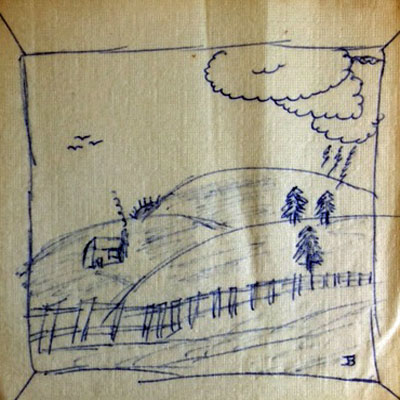
Sea Gull Cellar Bar Napkin Art, artist unknown
The Darkling Thrush
Thomas Hardy
I leant upon a coppice gate
When Frost was spectre-grey,
And Winter’s dregs made desolate
The weakening eye of day.
The tangled bine-stems scored the sky
Like strings of broken lyres,
And all mankind that haunted nigh
Had sought their household fires.
The land’s sharp features seemed to be
The Century’s corpse outleant,
His crypt the cloudy canopy,
The wind his death-lament.
The ancient pulse of germ and birth
Was shrunken hard and dry,
And every spirit upon earth
Seemed fervourless as I.
At once a voice arose among
The bleak twigs overhead
In a full-hearted evensong
Of joy illimited;
An aged thrush, frail, gaunt, and small,
In blast-beruffled plume,
Had chosen thus to fling his soul
Upon the growing gloom.
So little cause for carolings
Of such ecstatic sound
Was written on terrestrial things
Afar or nigh around,
That I could think there trembled through
His happy good-night air
Some blessed Hope, whereof he knew
And I was unaware.
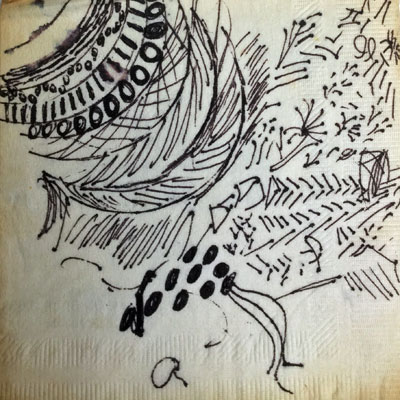
Sea Gull Cellar Bar Napkin Art, artist unknown
If I Could Tell You
WH Auden
Time will say nothing but I told you so
Time only knows the price we have to pay;
If I could tell you I would let you know.
If we should weep when clowns put on their show,
If we should stumble when musicians play,
Time will say nothing but I told you so.
There are no fortunes to be told, although,
Because I love you more than I can say,
If I could tell you I would let you know.
The winds must come from somewhere when they blow,
There must be reason why the leaves decay;
Time will say nothing but I told you so.
Perhaps the roses really want to grow,
The vision seriously intends to stay;
If I could tell you I would let you know.
Suppose the lions all get up and go,
And the brooks and soldiers run away;
Will Time say nothing but I told you so?
If I could tell you I would let you know.
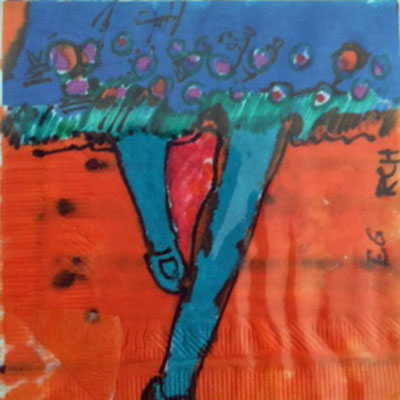
Sea Gull Cellar Bar Napkin Art, Roy Hoggard & Estelle Grunewald artists
A Red, Red Rose
Robert Burns
O my Luve’s like a red, red rose,
That’s newly sprung in June:
O my Luve’s like the melodie,
That’s sweetly play’d in tune.
As fair art thou, my bonie lass,
So deep in luve am I;
And I will luve thee still, my dear,
Till a’ the seas gang dry.
Till a’ the seas gang dry, my dear,
And the rocks melt wi’ the sun;
And I will luve thee still, my dear,
While the sands o’ life shall run.
And fare-thee-weel, my only Luve!
And fare-thee-weel, a while!
And I will come again, my Luve,
Tho’ ’twere ten thousand mile!
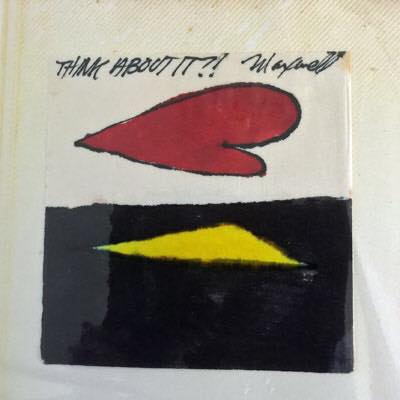
Sea Gull Cellar Bar Napkin Art, James Maxwell artist
To the Muses
by William Blake
Whether on Ida’s shady brow,
Or in the chambers of the East,
The chambers of the sun, that now
From ancient melody have ceas’d;
Whether in Heav’n ye wander fair,
Or the green corners of the earth,
Or the blue regions of the air,
Where the melodious winds have birth;
Whether on crystal rocks ye rove,
Beneath the bosom of the sea
Wand’ring in many a coral grove,
Fair Nine, forsaking Poetry!
How have you left the ancient love
That bards of old enjoy’d in you!
The languid strings do scarcely move!
The sound is forc’d, the notes are few!
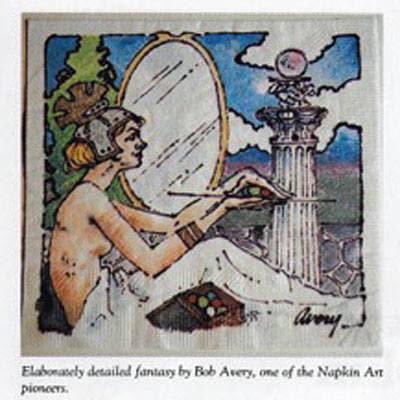
Sea Gull Cellar Bar Napkin Art, Bob Avery artist
Phantom Limbs
Anne Michaels
“The face of the city changes more quickly, alas! than the mortal heart.” —Charles Baudelaire
So much of the city
is our bodies. Places in us
old light still slants through to.
Places that no longer exist but are full of feeling,
like phantom limbs.
Even the city carries ruins in its heart.
Longs to be touched in places
only it remembers.
Through the yellow hooves
of the ginkgo, parchment light;
in that apartment where I first
touched your shoulders under your sweater,
that October afternoon you left keys
in the fridge, milk on the table.
The yard – our moonlight motel –
where we slept summer’s hottest nights,
on grass so cold it felt wet.
Behind us, freight trains crossed the city,
a steel banner, a noisy wall.
Now the hollow diad !
floats behind glass
in office towers also haunted
by our voices.
Few buildings, few lives
are built so well
even their ruins are beautiful.
But we loved the abandoned distillery:
stone floors cracking under empty vats,
wooden floors half rotted into dirt;
stairs leading nowhere; high rooms
run through with swords of dusty light.
A place the rain still loved, its silver paint
on rusted things that had stopped moving it seemed, for us.
Closed rooms open only to weather,
pungent with soot and molasses,
scent-stung. A place
where everything too big to take apart
had been left behind.
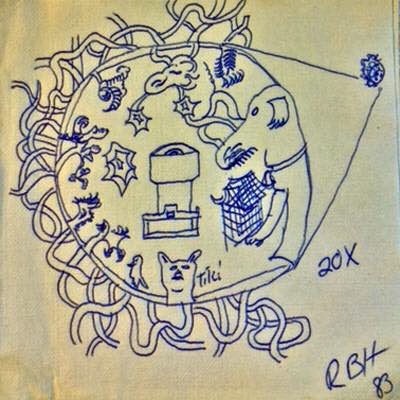
Sea Gull Cellar Bar Napkin Art, RBH artist
Double, Double Toil and Trouble
William Shakespeare from Macbeth
Double, double toil and trouble;
Fire burn and caldron bubble. Fillet of a fenny snake, In the caldron boil and bake; Eye of newt and toe of frog, Wool of bat and tongue of dog, Adder’s fork and blind-worm’s sting, Lizard’s leg and howlet’s wing, For a charm of powerful trouble, Like a hell-broth boil and bubble.
Double, double toil and trouble;
Fire burn and caldron bubble.
Cool it with a baboon’s blood,
Then the charm is firm and good.
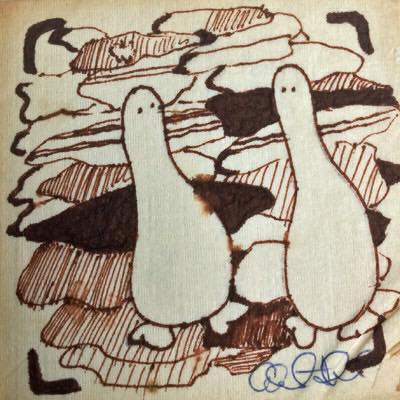
Sea Gull Cellar Bar Napkin Art, artist unknown
The Yellow Stocking
Masoud Ahmadi
Ah
what is that blessed rain doing
to these late days of July
the Persian silk tree the black locust tree
that late-blooming fireweed
and this weeping willow
which only just turned a deep green
To windows rooftops
to words we remember less
Don’t hang up
wait to hear the gutter’s cough the sparrow’s sneeze
and the sigh of a me who still thinks of you
Ah
what is that blessed rain doing
to these late days of July
the leaves poised to fall ancient benches
and the empty chair of a woman
who left in the corner of my mind
a sidelong glass
a slanted smile and one yellow stocking
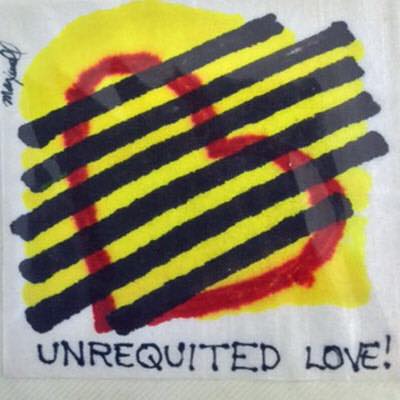
Sea Gull Cellar Bar Napkin Art, James Maxwell artist
A Meditation in the Desert
Ursula K. Le Guin
As thought to mind, so to the string
plucked, or touched, or bowed, the music is,
a wrinkling of the air as immaterial
and brief as sunlight glancing on a wave.
The silence in these empty lands is long.
Voice is as mortal as the word it says,
with little time to speak the thought, to tell
or sing the quick idea of those who live.
So brief the spoken word, the airy thing
in which are placed our deepest constancies,
though by it love or life may stand or fall,
and in it is the power to ruin or save.
The silence in these empty lands is long.
Rock has no tongue to speak or voice to sing,
mute, heavy matter. Yet as I life up this
dull desert stone, the weight of it is full
of slower, longer thoughts than mind can have.
Be my mind, stone lying on my grave.
The silence in these empty lands is long.
The stars have long to listen. Be my song.
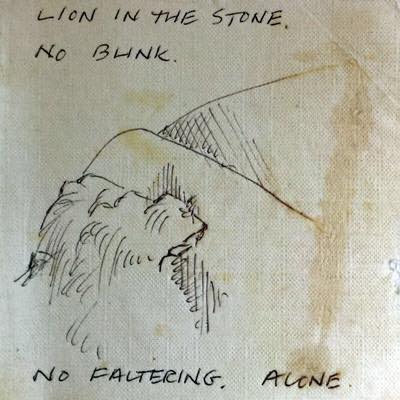
Sea Gull Cellar Bar Napkin Art, artist unknown
Liberty
Edward Thomas
The last light has gone out of the world, except
This moonlight lying on the grass like frost
Beyond the brink of the tall elm’s shadow.
It is as if everything else had slept
Many an age, unforgotten and lost –
The men that were, the things done, long ago,
All I have thought; and but the moon and I
Live yet and here stand idle over a grave
Where all is buried. Both have liberty
To dream what we could do if we were free
To do some thing we had desired long,
The moon and I. There’s none less free than who
Does nothing and has nothing else to do,
Being free only for what is not to his mind,
And nothing is to his mind. If every hour
Like this one passing that I have spent among
The wiser others when I have forgot
To wonder whether I was free or not,
Were piled before me, and not lost behind,
And I could take and carry them away
I should be rich; or if 1 had the power
To wipe out every one and not again
Regret, I should be rich to be so poor.
And yet I still am half in love with pain,
With what is imperfect, with both tears and mirth,
With things that have an end, with life and earth,
And this moon that leaves me dark within the door.

Sea Gull Cellar Bar Napkin Art, artist unknown
Skunk Hour
Robert Lowell
(For Elizabeth Bishop)Dedication Lowell’s poem is modeled on Elizabeth Bishop’s poem “The Armadillo,” which Bishop had dedicated to Lowell
Nautilus Island’s hermit
heiress still lives through winter in her Spartan cottage;
her sheep still graze above the sea.
Her son’s a bishop. Her farmer
is first selectman in our village;
she’s in her dotage.
Thirsting for
the hierarchic privacy
of Queen Victoria’s century,
she buys up all
the eyesores facing her shore,
and lets them fall.
The season’s ill—
we’ve lost our summer millionaire,
who seemed to leap from an L. L. Bean
catalogue. His nine-knot yawl
was auctioned off to lobstermen.
A red fox stain covers Blue Hill.
And now our fairy
decorator brightens his shop for fall;
his fishnet’s filled with orange cork,
orange, his cobbler’s bench and awl;
there is no money in his work,
he’d rather marry.
One dark night,
my Tudor Ford climbed the hill’s skull;
I watched for love-cars . Lights turned down,
they lay together, hull to hull,
where the graveyard shelves on the town. . . .
My mind’s not right.
A car radio bleats,
“Love, O careless Love. . . .” I hear
my ill-spirit sob in each blood cell,
as if my hand were at its throat. . . .
I myself am hell;
nobody’s here—
only skunks, that search
in the moonlight for a bite to eat.
They march on their soles up Main Street:
white stripes, moonstruck eyes’ red fire
under the chalk-dry and spar spire
of the Trinitarian Church.
I stand on top
of our back steps and breathe the rich air—
a mother skunk with her column of kittens swills the garbage pail
She jabs her wedge-head in a cup
of sour cream, drops her ostrich tail,
and will not scare.
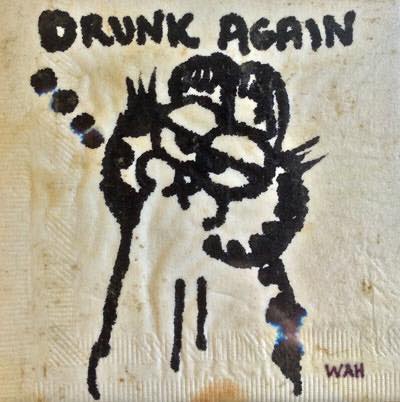
Sea Gull Cellar Bar Napkin Art, WAH artist
The Blue House
Tomas Tranströmer
It is night with glaring sunshine. I stand in the woods and look towards my house with its misty blue walls. As though I were recently dead and saw the house from a new angle.
It has stood for more than eighty summers. Its timber has been impregnated, four times with joy and three times with sorrow. When someone who has lived in the house dies it is repainted. The dead person paints it himself, without a brush, from the inside.
On the other side is open terrain. Formerly a garden, now wilderness. A still surf of weed, pagodas of weed, an unfurling body of text, Upanishades of weed, a Viking fleet of weed, dragon heads, lances, an empire of weed.
Above the overgrown garden flutters the shadow of a boomerang, thrown again and again. It is related to someone who lived in the house long before my time. Almost a child. An impulse issues from him, a thought, a thought of will: “create. . .draw. ..” In order to escape his destiny in time.
The house resembles a child’s drawing. A deputizing childishness which grew forth because someone prematurely renounced the charge of being a child. Open the doors, enter! Inside unrest dwells in the ceiling and peace in the walls. Above the bed there hangs an amateur painting representing a ship with seventeen sails, rough sea and a wind which the gilded frame cannot subdue.
It is always so early in here, it is before the crossroads, before the irrevocable choices. I am grateful for this life! And yet I miss the alternatives. All sketches wish to be real.
A motor far out on the water extends the horizon of the summer night. Both joy and sorrow swell in the magnifying glass of the dew. We do not actually know it, but we sense it: our life has a sister vessel which plies an entirely different route. While the sun burns behind the islands.

Sea Gull Cellar Bar Napkin Art, Roy Hoggard & Estelle Grunewald artists
Throw Yourself Like Seed
Miguel de Unamuno
Shake off this sadness, and recover your spirit;
Sluggish you will never see the wheel of fate
That brushes your heel as it turns going by,
The man who wants to live is the man in whom life is abundant.
Now you are only giving food to that final pain
Which is slowly winding you in the nets of death,
But to live is to work, and the only thing which lasts
Is the work; start there, turn to the work.
Throw yourself like seed as you walk, and into your own field,
Don’t turn your face for that would be to turn it to death,
And do not let the past weigh down your motion.
Leave what’s alive in the furrow, what’s dead in yourself,
For life does not move in the same way as a group of clouds;
From your work you will be able one day to gather yourself.
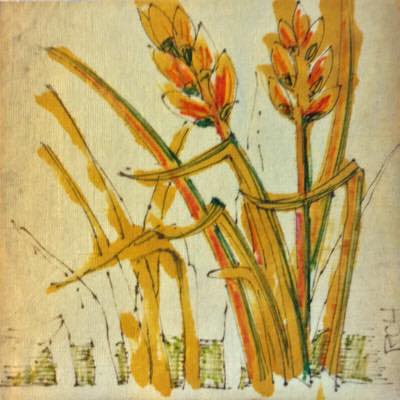
Sea Gull Cellar Bar Napkin Art, artist unknown
Respublica
Geoffrey Hill
The strident high
civic trumpeting
of misrule. It is
what we stand for.
Wild insolence,
aggregates without
distinction. Courage
of common men:
spent in the ruck
their remnant witness
after centuries
is granted them
like a pardon.
And other fealties
other fortitudes
broken as named—
Respublica
brokenly recalled,
its archaic laws
and hymnody;
and destroyed hope
that so many times
is brought with triumph
back from the dead.

Sea Gull Cellar Bar Napkin Art, artist unknown
Limits
Jorge Luis Borges
There is a line of Verlaine I shall not recall again,
There is a nearby street forbidden to my step, There is a mirror that has seen me for the last time, There is a door I have shut until the end of the world. Among the books in my library (I have them before me) There are some I shall never reopen. This summer I complete my fiftieth year: Death reduces me incessantly.
—Translated by Anthony Kerrigan
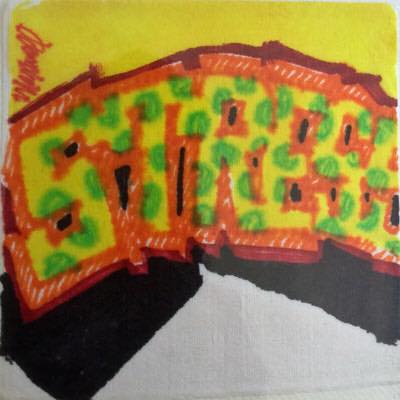
Sea Gull Cellar Bar Napkin Art, James Maxwell artist

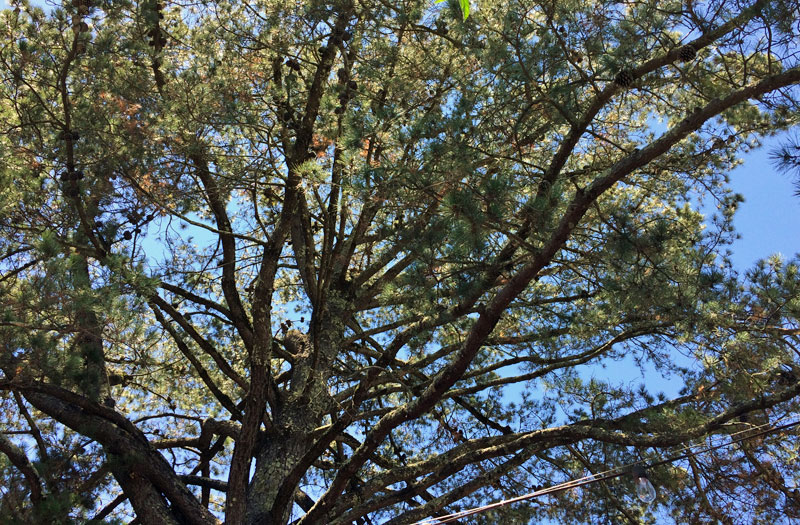
Thanks! Good old days!!
My father recently passed away and the lawyer handling his estate sent me a big bundle of photos, scrapbooks, and letters. Included were copies (apparently copied on a Navy typewriter by a yeoman) of letters written by my mother’s cousin Dr. Harold Robinson, Ltjg, while he was serving on the USS Lansdowne in Tokyo Bay during the Japanese surrender ceremonies on the Missouri. The Lansdowne was the ship chosen to shuttle the Japanese delegation to and from the Missouri. I found through google that you had written a nice piece about Dr. Robinson, so I thought you might like these —
https://docs.google.com/document/d/1HwAXE1h1HD8GFV25Sebw0-s4Zg6jlxfEB4D2W0IgaGU/pub
https://docs.google.com/document/d/1bjh-_Ra7YLKAzS_WgUd_QmkglkW0Bc3pfSnkvrEgfy0/edit
Thank you so much! Those are priceless. I will see that they are passed around among the friends of Harold’s I know.